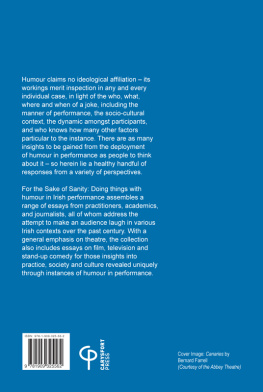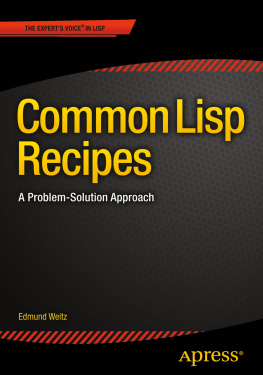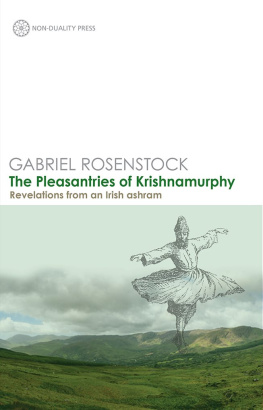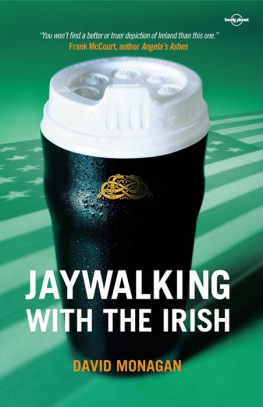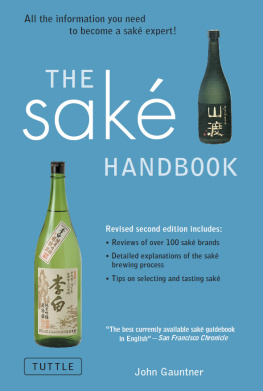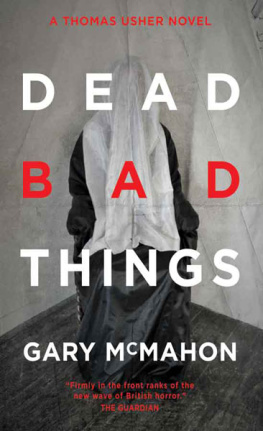Weitz - For the Sake of Sanity: Doing Things with Humour in Irish Performance
Here you can read online Weitz - For the Sake of Sanity: Doing Things with Humour in Irish Performance full text of the book (entire story) in english for free. Download pdf and epub, get meaning, cover and reviews about this ebook. year: 2015, publisher: Carysfort Press Limited, genre: Detective and thriller. Description of the work, (preface) as well as reviews are available. Best literature library LitArk.com created for fans of good reading and offers a wide selection of genres:
Romance novel
Science fiction
Adventure
Detective
Science
History
Home and family
Prose
Art
Politics
Computer
Non-fiction
Religion
Business
Children
Humor
Choose a favorite category and find really read worthwhile books. Enjoy immersion in the world of imagination, feel the emotions of the characters or learn something new for yourself, make an fascinating discovery.
- Book:For the Sake of Sanity: Doing Things with Humour in Irish Performance
- Author:
- Publisher:Carysfort Press Limited
- Genre:
- Year:2015
- Rating:3 / 5
- Favourites:Add to favourites
- Your mark:
- 60
- 1
- 2
- 3
- 4
- 5
For the Sake of Sanity: Doing Things with Humour in Irish Performance: summary, description and annotation
We offer to read an annotation, description, summary or preface (depends on what the author of the book "For the Sake of Sanity: Doing Things with Humour in Irish Performance" wrote himself). If you haven't found the necessary information about the book — write in the comments, we will try to find it.
Weitz: author's other books
Who wrote For the Sake of Sanity: Doing Things with Humour in Irish Performance? Find out the surname, the name of the author of the book and a list of all author's works by series.
For the Sake of Sanity: Doing Things with Humour in Irish Performance — read online for free the complete book (whole text) full work
Below is the text of the book, divided by pages. System saving the place of the last page read, allows you to conveniently read the book "For the Sake of Sanity: Doing Things with Humour in Irish Performance" online for free, without having to search again every time where you left off. Put a bookmark, and you can go to the page where you finished reading at any time.
Font size:
Interval:
Bookmark:
For the Sake of Sanity:
Doing things with humour in Irish performance
For the Sake of Sanity:
Doing things with humour in Irish performance
Edited by Eric Weitz
Carysfort Press
A Carysfort Press Book
For the Sake of Sanity:
Doing things with humour in Irish performance
Edited by Eric Weitz
First published in Ireland in 2014 as a paperback original by
Carysfort Press, 58 Woodfield, Scholarstown Road
Dublin 16, Ireland
ISBN 978-1-909-325-56-2
2014 Copyright remains with the authors
Typeset by Carysfort Press
Cover design by eprint limited
Printed and bound by eprint limited
Unit 35
Coolmine Industrial Estate
Dublin 15
Ireland
Digital editions published in 2015
Digitized by ePubDirect.com
Mobi ISBN: 978-1-909325-68-5
ePub ISBN: 978-1-909325-69-2
This book is published with the financial assistance of The Arts Council (An Chomhairle Ealaon) Dublin, Ireland

Caution: All rights reserved. No part of this book may be printed or reproducedor utilized in any form or by any electronic, mechanical, or other means, now known or hereafter invented including photocopying and recording, or in any information storage or retrieval system without permission in writing from the publishers.
This book is sold subject to the conditions that it shall not, by way of trade or otherwise, be lent, resold, hired out, or otherwise circulated in any form of binding, or cover other than that in which it is published and without a similar condition, including this condition, being imposed on the subsequent purchaser
1 | Introduction
Eric Weitz
There is no getting around the fact that humour in performance is an unruly mess from an analytical perspective. Not that people from any walks of life scholars, practitioners and civilians alike can resist the call to ruminate upon laughter and its causes. Drama (of any medium) and humour are two areas in which diverse and strongly held opinion remain the ways of the world and very much the point. Funniness is not a property of things its an uncertifiable effect that writers, actors, directors and comedians venture, and so it is a seductive yet dangerous subject for any kind of earnest contemplation.
Let us start with what we know: All humans laugh, the scientists tell us, but decidedly not at the same things nor necessarily under the same conditions, due to the deep nesting of humorous laughter in cultural root systems and the precise context in which it occurs. Every joke or, perhaps, every good joke is a risk taken, a stress test for the relationship. A hearty laugh from your audience (from one close friend to a theatre full of strangers to the internets quasi-infinite sprawl of virtual spectators) usually demands an element of surprise, and often a testing of boundaries: sufficient knowledge/awareness to get the joke, an involuntary inclination to endorse its ridicule, and, ideally, some hint of newness to the point, a sense of someone having momentarily stepped into your body to perceive the world exactly as you do.
Humour a social transaction dedicated, among other things, to causing laughter is a highly sophisticated interactive tool, charged with smoothing discomfort, gaining consensus, assuring lack of ill will, seduction (in various senses of the word), and other interpersonal projects. When deployed in performance, that is, in circumstances pointedly public, if not commercial, there are many additional permutations, as a joke made to an audience of more than one is made co-presently to each individual and to the collective body of spectators (and think of what that means for the age of stand-up gigs recorded live for later viewing by television audiences).
Under the subtitle, Doing things with humour in Irish performance, the guiding rationale for this collection has from the start been to ask a bunch of people to provide some personal perspective on just the kinds of issues mooted above. A main title was harder to come by, requiring, as it does, certain weight-bearing capabilities: an obligation to catch the eye and the fancy, while presenting some crystallizing image of the collections broad embrace.
In fact, the collection started life a few years ago under the title, Dublin City Comedy, an allusion to a dramatic sub-genre identified on London stages in the early years of the seventeenth century. One of the defining characteristics of City Comedy was that it consciously did things with humour; it is characterised generally as driven by satiric impulse and arising from the brew of socially recognisable figures mixing and conniving in localised contexts spawned by advancing economic influence. While the description evoked something of the books guiding spirit and resonated with something in the contemporary Irish air, the phrase itself came to misrepresent the range of contributions by a good two-thirds, with restrictive notions of Dublin and city left by the wayside. The catchphrase, only jokin, was considered briefly, with its vernacular familiarity symbolizing with useful fuzziness the fact that we do things with humour all the time in everyday life, and that the mechanism is no different from the variously customized models deployed in theatre, film, television, stand-up and online performance.
Sean OCaseys essay, The Power of Laughter, however, had supplied the title of my first collection ten years ago, and I saw no reason to resist returning to the well. OCaseys short, unassuming essay carries no shortage of insight into the nature and purpose of laughter, and this time through, I found the following: Were all very low fellows, for all of us, sometime or another, are conscious humourists. And well we are, for our souls sake, and for the sake of mans sanity. We couldnt live without comedy. So it is for the sake of sanity that humans come equipped with senses of humour, for the purpose of psychic survival in an uncooperative, ridiculous and infuriating world. It can be no surprise, then, that humour features in our dramatic confections and other performance structures.
Back, now, to all those perspectives you might not always get in a scholarly collection. It has long been my contention that insightful thinking need not adopt only the language of the academy, and so this book may well prove an unruly melange for some readers. But the kinds of points we make are inseparable from the language we use to make them, and so, for me, it was important to include a range of voices in terms of discursive orientation and political bearing. Make no mistake: Humour claims no ideological affiliation its workings merit inspection in any and every individual case, in light of the who, what, where and when of a joke, including the socio-cultural context, the target of ridicule, and who knows how many other factors particular to the instance.
By inviting practitioners and journalists as well as academics to contribute to the collection, I have sought to avail of a broad range of subjective responses, and so the exceedingly multi-vocal nature of this collection includes insights into creative process, opinions on social/cultural/theatrical trends and other pronouncements one would not ordinarily expect to find in an academic collection. The contributions sometimes overlap and sometimes contest one another. The common starting point is that all the contributors have been asked primarily to put their minds to the subject of humour used or found in some Irish performance-related context over the past hundred years.
As a result, we have a scholarly and personal reflection by Christopher Murray who in making a case about the comic heart of Hugh Leonards dramatic works furnishes an historical overview of the past hundred years or so alongside impassioned arguments about the state of Irish humour by Meadhbh McHugh, who highlights a robust appropriation of humorous discourse in a next wave of feminist agency; and John Waters, who, in setting out to ruminate upon the state of comedy on Irish television (or is it Irish comedy on television?) goes on to venture some wide-ranging and provocative thoughts about comedy and the current orthodoxy of public discourse.
Next pageFont size:
Interval:
Bookmark:
Similar books «For the Sake of Sanity: Doing Things with Humour in Irish Performance»
Look at similar books to For the Sake of Sanity: Doing Things with Humour in Irish Performance. We have selected literature similar in name and meaning in the hope of providing readers with more options to find new, interesting, not yet read works.
Discussion, reviews of the book For the Sake of Sanity: Doing Things with Humour in Irish Performance and just readers' own opinions. Leave your comments, write what you think about the work, its meaning or the main characters. Specify what exactly you liked and what you didn't like, and why you think so.

